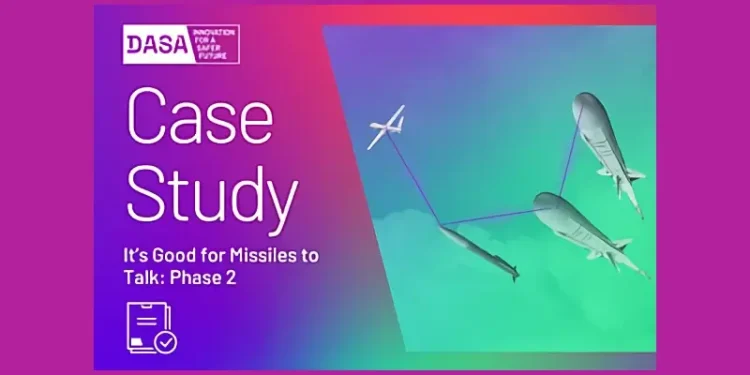Smart missile technology is reshaping the future of defence, and the UK is playing a pivotal role.
The Defence and Security Accelerator (DASA) has teamed up with defence primes and industry innovators to spearhead the development of cooperative missile systems—missiles that can “talk” to each other, making tactical decisions mid-flight.
Innovation in Missile Technology: Who, What, Where, and Why?
In 2022, DASA launched the “It’s Good for Missiles to Talk” competition on behalf of the Defence Science and Technology Laboratory (Dstl). This initiative aimed to develop missile systems that can communicate, share data, and coordinate their actions during operations.
With government support and partnerships with UK defence primes, including MBDA and Thales, DASA has taken a bold step toward transforming missile warfare.
Phase 2 of the competition, launched in 2023, deepened collaboration and accelerated development, leading to remarkable technological advancements.
Building Dynamic Partnerships with Defence Industry Leaders
Collaboration is the name of the game in modern defence technology. DASA has been working closely with defence primes, government bodies, and industry innovators to advance the Cooperative Missile Project. Securing the expertise of major UK defence primes like MBDA and Thales was essential.
Their involvement ensured that the missile technology could be evaluated effectively, and innovation could be integrated seamlessly into existing UK defence systems.
Dr Colm Kelly, Senior Hardware Solution Architect at Thales said,
“Collaborating with UK primes and innovators has brought fresh perspectives and meaningful conversations to the forefront. These partnerships allow us to push the boundaries of what’s possible in missile technology.”
Innovators Taking the Lead
Several ground-breaking technologies were funded through the competition, with a total investment of £1.4 million. A mix of universities, large corporations, and SMEs contributed to developing innovative solutions that promise to reshape missile capabilities.
Here are a few examples of what emerged from the competition:
- Bornea Dynamics developed advanced neural networks and communication algorithms for real-time decision-making.
- Swansea University introduced improved antenna capabilities, boosting missile responsiveness.
- Origami Labs UK Ltd. created a collaborative sensing technology for adaptive missile planning.
These developments will allow missiles to adapt to their environment and threats dynamically, creating a more flexible and responsive system of defence.
Why Cooperative Missiles Matter
Cooperative missiles offer an exciting leap in capability. Unlike traditional systems that act independently, these advanced systems are designed to:
- Share real-time situational data,
- Coordinate their movements for maximum efficiency,
- React to changing battlefield conditions.
By fostering communication between missiles, the system becomes more robust, capable of overcoming threats with greater precision.
The Future of Defence
Looking ahead, the potential for cooperative missile systems extends far beyond the battlefield. By improving the efficiency of military operations, reducing costs, and enhancing mission success, these systems could play a vital role in maintaining national security for years to come.
DASA’s programme exemplifies how government and industry collaboration can spur innovation.
As Ian Fairclough, Head of Critical Technologies at MBDA, noted,
“The competition introduced us to new suppliers and technologies that can fill gaps in our current systems, making the UK defence sector stronger and more resilient.”
Milestones and Next Steps
The success of Phase 2 is clear: six new missile technologies have been funded and developed, with direct collaboration between innovators, government bodies, and defence primes.
However, the journey doesn’t end here. Future phases are expected to focus on further refinement, field testing, and potential integration into active military systems.
The Top Achievements of Phase 2:
- £1.4 million investment in missile innovation.
- Six new technologies developed, including adaptive planning and real-time decision-making systems.
- Stronger partnerships between DASA, MOD, and UK defence primes.
The competition’s achievements have already accelerated the adoption of smarter missile technologies.
As James Holder from DE&S pointed out,
“Collaborating with small innovators through DASA allowed us to discover new capabilities that can support our technology development objectives.”
A New Chapter in Defence
DASA’s work in cooperative missile development represents a significant step forward for UK defence. With partnerships strengthening, and technology evolving rapidly, the future of missile warfare looks smarter, faster, and more coordinated.
As DASA continues to lead the charge, the defence sector will undoubtedly see these innovations transition into real-world applications, enhancing both national security and global defence capabilities.
By enabling missiles to “talk,” the UK is spearheading a new era of defence technology—one that prioritises innovation, collaboration, and adaptability.
Sources: THX News & Defence and Security Accelerator.









